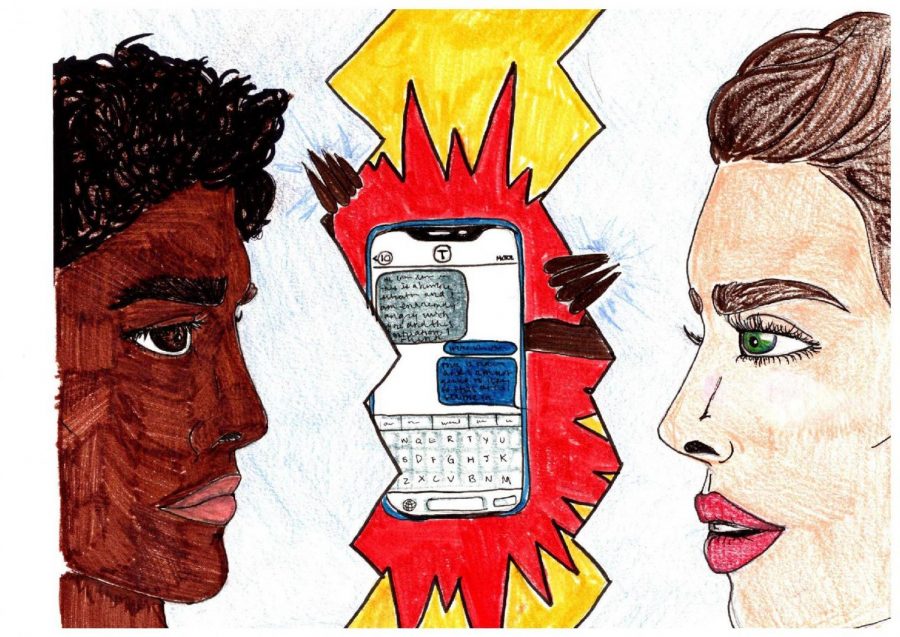Let’s talk, not text: technology should not be used to resolve conflict
August 21, 2019
Arguments. We all get in them. They can be extremely frustrating and problematic, especially when it is with someone we care about. Watching those three dots come up after you write a long paragraph telling someone how you feel about your relationship can be nerve-wracking. And what is the easiest way to combat these nerves? Jump to your phone to send a long text to whomever to say how you feel. What could go wrong? While it can be nice to avoid the reaction of the person you are trying to talk to, when trying to resolve a problem with someone you have a relationship with, typing relentlessly behind a screen is not the way to go.
Like everyone, I am guilty of turning to technology to avoid confrontation. In my younger years, I was painfully shy and when I mean painful, I mean excruciately so. I was always quick to avoid others and would be very nervous when talking to new people. Therefore, when someone would have a problem and would bring it up in a message, I would be grateful because I could think up a methodical answer to convey my point.
However, now that I am older, I see the downside of it. Real feelings cannot always be said with periods, exclamations and emojis. By using text, SnapChat or Instagram, we are creating a gray area because we are only limited to what we can type and with that gray area, misinterpretations can come about. And with those misinterpretations, a lot more drama and pain can occur with both parties involved.
“I don’t think that social media is the best way to confront people about relational problems. I say that because people can interpret what you’re trying to say [which can be] completely different than how you’re trying to come across,” says sophomore Isabel McDermott. “I feel like it’s best to work out relational problems in person, I feel like there should be physical connections, especially if the situation is difficult.”
Our social media centered society has made us quick to turn on our screens for any type of comment or reaction. This type of mentality causes many people to be infatuated with what goes on behind the screen and then the more we absorb ourselves into this world, the less connection we have with others.
There are many real-life examples of this. Just over the summer, Trump raced to Twitter to attack prominent politicians — Alexandria Ocasio-Cortez, Ilhan Omar, Ayanna Pressley and Rashida Tlaib — also known as “The Squad”. He was quick to criticize them as people before analyzing their policies. From fostering “send her back” chants at rallies to tweeting “AOC plus 3 are a nightmare for America”, Trump’s actions exemplify not only his racist character, but the type of online behavior that creates a deeper divide with people whom he should be working with in the government.
Trump’s behavior is an example of modern-day cyberbullying.
“I think nowadays everyone on social media and online is toxic plus cruel to this world. People say all the time “think before you type” is the same thing as “think before you speak”. However, it is not the same because online people say whatever and sometimes they say bad things to people and that causes cyberbullying,” says sophomore Shania Wright. “People take things to heart and even if you leave a bad comment, tweet something, it’s still the same thing; you are hurting someone and that makes the world a cruel place if everyone is hating.”
According to a study published in 2014 in the journal of Environment and Behavior, people without a mobile device held more empathic concern for others than the people who kept their devices while interacting with others face-to-face.When close friends were in conversation and both participants had mobile devices, their empathy towards one another was less than if two acquaintances without phones were in conversation. This study shows just how much social media and our phones can influence our interactions.
Technology can be useful in terms of communication and speed, but that speed can be detrimental to a relationship if the proper time and thought is not put into why you are upset and how you want to deal with it. In our fast-paced lives of 2019, sitting down to have a conversation can seem unnecessary, but when working out relational problems, the time you take can save a relationship. While many of our public leaders — like Trump — may not be an example of how to develop relationships, by turning the phone off, you can show self-control and be an example for others.
Right now with this new school year, there is an opportunity for us to rework how we handle confrontations. Instead of rushing to your phone when facing a relational problem, try finding a way to be able to talk it out with whomever is involved. By using more face-to-face communication, we can avoid shallow comments and cyberbullying behavior. With this new school year, let’s put down our phones and use our voices.





















